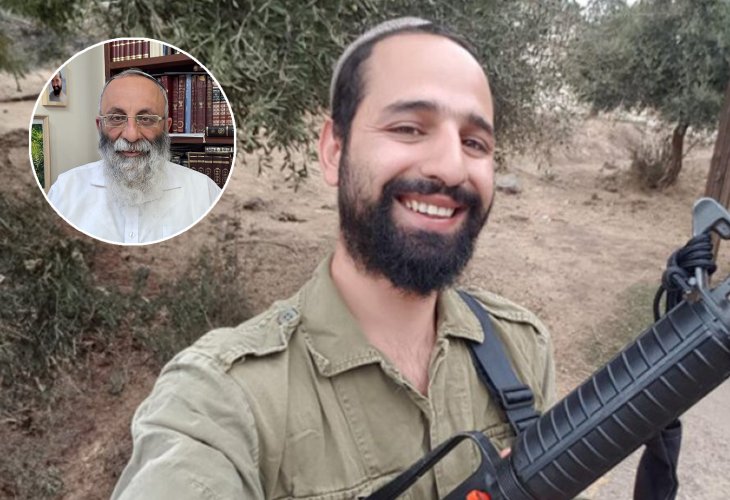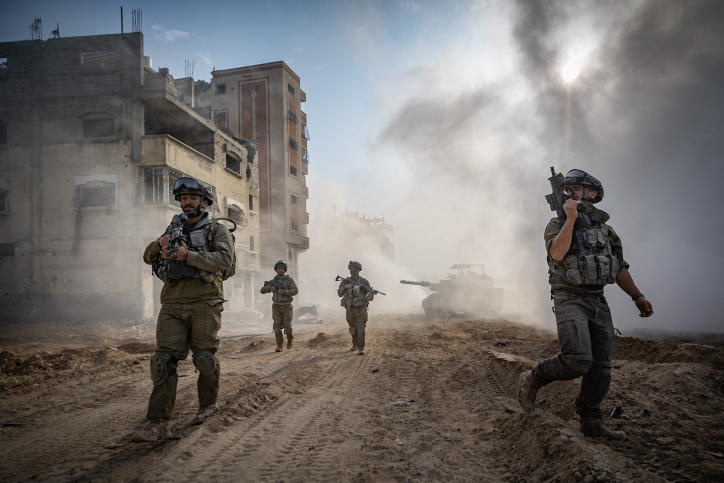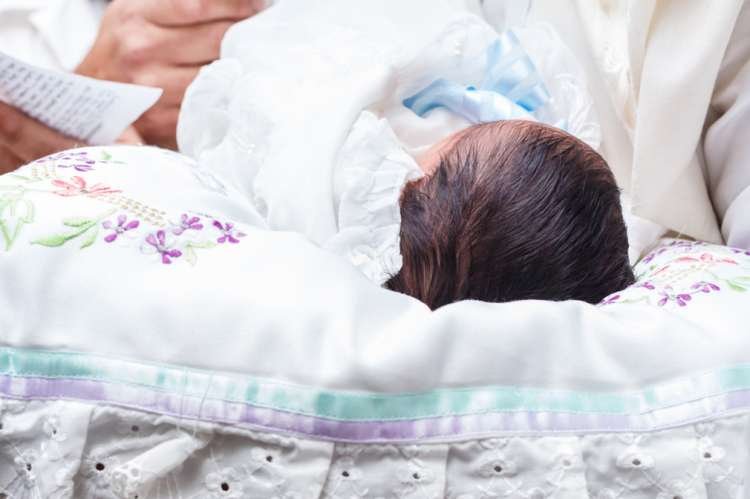Choosing Life After Loss: Rabbi Yoram Eliahu's Journey
Rabbi Yoram Eliahu shares the story of losing his son, Yedidya, in Gaza and embracing new beginnings with his grandson’s birth.
 In the circle: Rabbi Yoram Eliahu, with his son Yedidya Eliyahu z"l in the background (Photo: Courtesy of the family)
In the circle: Rabbi Yoram Eliahu, with his son Yedidya Eliyahu z"l in the background (Photo: Courtesy of the family)Rabbi Yoram Eliahu, father of the revered soldier Yedidya z"l, vividly recounts the dream he had two days before his son's tragic fall in Gaza. "It happened on Wednesday, the 17th of Cheshvan," he recalls. "I fell asleep in the afternoon, and in my dream, I saw Yedidya entering our home, gleefully saying, 'Hello, I'm back.' Suddenly, I was blinded by a bright light. I awoke, pondering the source of this intense light—was it from this world or the next? When my wife entered the room, I chose to interpret the dream positively, telling her, 'I dreamed Yedidya came home and was accompanied by a great light.'"
"Two days later, on Friday," continues Rabbi Eliahu, "we received the devastating news of his death. The officers told us we'd have a chance to say goodbye before the funeral. After his wife bid farewell, I approached him with some of my children. I looked at his face and saw the same light I had seen in my dream. He seemed not dead, but alive in a higher realm, with a serene expression."
"During the shiva, others shared seeing such light on the holy faces of those who fell while fighting our ruthless enemies, sanctifying Hashem's name. We believe we're in a new phase of Israel's redemption, and this light is a new light Hashem shines on Zion."
Rabbi Yoram Eliahu serves as a rabbi at the Meir Institute and Morasha School. As a rabbi, he guides grooms and demonstrates resilience and deep faith, urging the people of Israel to follow his blessed son's path.
“The News Came While Heading to Another Funeral”
Yedidya, only 25 at the time of his passing, enlisted right after Simchat Torah. He spent the holiday at the Ramat Gilad settlement near Karnei Shomron, where he lived with his wife Meitar and their two daughters. On the holiday morning, a rabbi advised them to use their phones for pikuach nefesh. After the holiday, Yedidya rushed to his combat engineering battalion. After about three weeks of training, they began the ground maneuver into Gaza. "His unit was among the first entering Gaza with the ground forces," Rabbi Eliahu relates. "On the Thursday before, he called to tell us he'd be entering the strip."
The Rabbi vividly remembers this call, which would be their last conversation. "He called my wife, spoke with her, and then she handed me the phone, saying he wanted to say goodbye before the battle," the bereaved father recalls. "At first, I wanted to tell him from a father's heart not to be the first to storm forward. I wanted to tell him to be cautious, as it's dangerous. But I kept silent, fearing my words might weaken his resolve in battle. Instead, I fortified my faith and reminded myself they fight for Hashem's name in holiness."
"My wife also considered messaging him to say we're praying for his safety," the rabbi continues. "Yet, she too felt it might unsettle him, knowing our worries. So, we strengthened our prayers without conveying our fears."
Yedidya fought bravely, not only within the strip but to even gain entry for battle. "His unit entered with three Puma IFVs," Rabbi Eliahu recounts. "Initially, the commanders informed him that due to operational needs, their Puma wouldn't enter but be handed to Sayeret Matkal soldiers. Yedidya wouldn't accept this. He urged his peers, 'We came to restore Israel's honor, to fight our enemies. We can't give up entry!' However, the decision was irreversible. Just then, one soldier among the other Pumas felt unwell and asked to remain outside. It was clear Yedidya would replace him, and so he entered Gaza."
How long did he fight inside Gaza?
"They fought continuously for five days, never leaving the Pumas. It's almost unimaginable—fighters barely sleeping, eating, focused solely on warfare. Throughout, Yedidya assured his comrades, 'Don't fear, Hashem is with us!' He would share King David’s words from Psalms, 'I will chase my enemies and overtake them, I will not turn back until they are destroyed.' These were his final words to his friends before he fell."
 (Illustrative Photo: Yonatan Sindel / Flash 90)
(Illustrative Photo: Yonatan Sindel / Flash 90)When did he fall in sanctification of Hashem's name?
"On Thursday night. They settled into 'shelters' for rest and chose the reinforced Pumas, believing them safer. Yet, as they slept, a shell struck the Puma, shrapnel piercing his pure heart. His fall occurred right before Shabbat Vayera, which recounts the binding of Isaac."
How did you receive the tragic news?
"I was en route to Mount Herzl, attending the funeral of Jonathan Brand, a local soldier and a former student of mine. My wife called me, saying, 'Yoram, I need you home now, stop and return.' Understanding something happened, I asked a friend to quickly take me back. Arriving, I found officers waiting."
"These soldiers," Rabbi Eliahu explains, "are tasked with the painful duty of delivering tragic news to families, sharing in their deep sorrow. Upon entering, I approached the notifying officer, saying, 'Don't be disheartened. We knew this was possible, Yedidya fell for the sanctification of the blessed Hashem.' During the shiva, I realized the impact my words had on the officer when he visited and said, 'You gave me a lesson in faith.'"
"The soldiers bringing such news support bereaved families throughout the shiva and beyond, with continued assistance as needed. The state's support for us is remarkable. Today, not only does the widow receive benefits, but we the parents do too, feeling embraced. After Abraham's battle in 'Lech Lecha,' it’s said, 'Even the young shall receive their share'; Rashi explains this refers to those assisting on the home front, echoing King David who similarly ensured rewards for them."
"Meitar, Yedidya's wife, learned the news under extraordinary circumstances. She saw the soldiers outside as she arrived with the girls, received the tragic news, and stayed with us, joined by her family, through Shabbat before the funeral."
How was the shiva period for you?
"Many came to console us," he responds. "One man, whose son died in an attack, greatly aided us, saying, 'You’ve traveled one path until now, but now you follow another, and you choose that way.' I constantly see this: one can be mired in grief, or choose otherwise. A bereaved parent suggested replacing 'bereaved family' with 'heroic family.' A Shabbat leaflet proposed announcing such news as, 'It can now be revealed another soldier joins the many Israeli heroes, sacrificing their lives for our security, fully aware this is their path.' Such a perspective makes bearing pain and sorrow easier."
What can you share about Yedidya's character?
"I'll share a story that illustrates his unique spirit. A year ago, for my birthday, he wrote, 'Dear Dad, we sat with friends pondering, if each generation is something new in the world, then what is our enhancement over our parents?' He emphasized 'enhancement,' meaning adding a level rather than negating. His answer was, 'Through the path of chassidut: not only learning and praying as before, but renewing with song and music, invigorating service to Hashem, and integrating Hashem into all life aspects.' Yedidya lived this way. In all he did, he felt a spiritual connection. Even working recently, he ensured it coincided with yeshiva studies."
"When asked how he was, he'd reply, 'Living the dream.' And he did, sincerely. He cherished his beloved wife and daughters, actually living his aspirations, with true joy."
"His character shone during his time in Gaza. Despite the grueling fight, one soldier, sharing the Puma, told us he never missed a prayer, which profoundly impressed me."
"After marrying, he lived in Safed, studying at the local hesder yeshiva, later moving to Ramat Gilad, aiming to help youth-at-risk, where he excelled."
A Moving Moment Under the Tallit at the Bris
On the 22nd of Adar I, the Eliahu family rejoiced for the birth of Yedidya z"l’s son. "The brit took place on Shabbat, so it wasn't publicly celebrated," says Rabbi Eliahu. "Nevertheless, many supported us, including a righteous man, Shai Graucher, who ensured an impeccable Shabbat for us. He organized the brit in a luxury hotel. It was an incredible Shabbat, every detail thoughtfully addressed. We're immensely grateful."
 (Photo: shutterstock)
(Photo: shutterstock)Mixed emotions, indeed.
"Undoubtedly. There were mixed feelings. There were halachic discussions about certain practices. For instance, there's debate on who should recite 'to bring him into the covenant of Abraham our father' when the baby’s father is absent. Some say not to bless, others that the grandfather should, as he's also responsible for his Torah education, or the sandek should. At his son’s brit, I was the sandek, so it was clear I’d bless. Being the mohel and presiding over my grandson’s circumcision was profoundly moving. Similar emotions arose when the mother recited 'Shehechiyanu.'"
"A touching moment during the brit was when my wife brought me Yedidya's tallit. It was Meitar's idea, wanting me to use his tallit for the brit and place some on the baby. It was an emotionally challenging moment. Wearing Yedidya's tallit, I was overwhelmed, wondering how I'd proceed."
What strengths emerged in this joyous yet complex event?
"I connected deeply with Hagai Luber's words, upon the birth of his grandson, son of his son Yehonatan z"l, who also fell in Gaza. He wrote inspiringly, 'Don't focus on what's missing: no father to carry him on his shoulders, no father to study with him at father-son classes, no father to carry him on Simchat Torah. Focus on what's there: there is joy, a new baby in the family, someone to say Kaddish after him...'"
"The baby is named Porat Aviyah," Rabbi Eliahu reveals. "Porat was a name Yedidya and Meitar previously considered. Meitar consulted Rabbi Ginsburg about the name, and he responded, 'Porat, in gematria, equals the phrase "You shall choose life."' It's remarkable. This is the message we're certain Yedidya would convey to us—this was precisely the aim of the battle he fell in, the struggle for Israel's revival. Which some call 'the second War of Independence.' We believe Yedidya fought for Israel's revival, and by his death, like all the holy, they commanded us to choose life."
Final thoughts.
"I believe Torah scholars must adopt the mindset of 'not leaving their post'—these aren't ordinary times. We truly believe the Torah empowers our fighters. I personally considered teaching my students during shiva, recalling Rabbi Ovadia Yosef ztz"l, who taught his regular lessons while sitting shiva for his father, under the premise of 'a rabbi the public needs.' However, an excellent tutor covered for me, so the students didn't miss out. Undoubtedly, everyone now is someone the public needs, to be empowered in Torah and mitzvot for our fighters' sake and those in captivity. 'When Hashem will return Zion’s captives, we will be as dreamers,'" he concludes.

